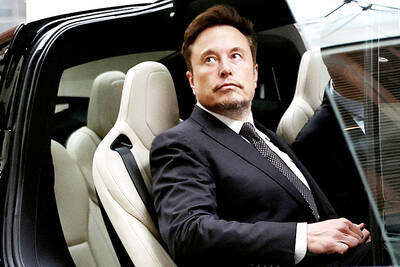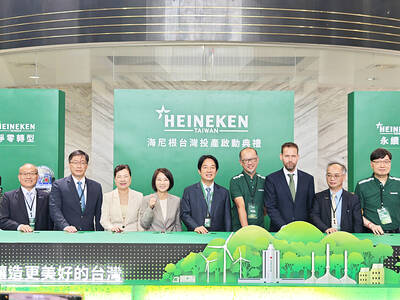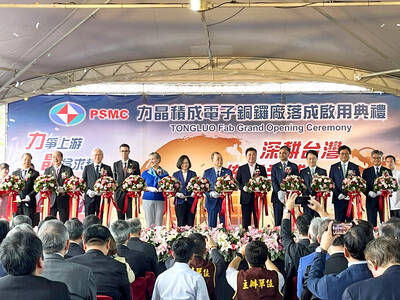Taiwan Semiconductor Manufacturing Co (TSMC, 台積電) yesterday posted its first revenue decline in five months, reporting NT$72.28 billion (US$2.31 billion) for last month amid customers’ inventory correction.
Sales contracted by 10.48 percent from October’s NT$80.74 billion. However, compared with the same period last year, revenue soared 63 percent from NT$44.33 billion.
The contraction was not a surprise, as TSMC co-chief executive Mark Liu (劉德音) had said in October that “cautious inventory adjustment actions taken by some of our customers will bring slower fourth-quarter demand.”
The company could still post record revenue for the current quarter, thanks to strong demand for 4G smartphones in China and increased orders for TSMC’s advanced 20-nanometer (20nm) chips, Liu said.
TSMC, which supplies processors for Apple Inc’s iPhone 6 series, has estimated that revenue for this quarter could grow by between 4 and 5 percent sequentially to between NT$217 billion and NT$220 billion, raising its total revenue this year by 27 percent to a record NT$757.29 billion.
TSMC forecast that revenue for next year would grow by 15 to 20 percent from this year, thanks to strong demand for its 20nm chips, new 16nm FinFET chips and 28nm chips, as well as less-advanced chips from its 8-inch factories.
Barclays Capital Securities Taiwan Ltd is also optimistic that TSMC’s growth momentum would carry into next year, adding that the company’s current growth forecast is much higher than its previous forecast of 10 percent annual expansion.
Moreover, the Hsinchu-based company might increase its capital spending for next year to more than US$12 billion, compared with an initial estimate of US$10 billion made in October, Barclays Capital analyst Andrew Lu (陸行之) said in a report released yesterday.
This year, TSMC plans to spend US$9.6 billion on new equipment mostly to boost its 20nm capacity.
The brokerage downplayed the impact of TSMC’s potential market share loss to rivals in the 16nm FinFET chip market next year and in 2016, and raised its share price target for TSMC to NT$180 from NT$170.
The upgrade has factored in the seasonal weakness next quarter after Apple ends ramp-up of its iPhone 6 series, Lu said.
Barclays’ 12-month target price implies 32.35 percent upside from TSMC’s closing price of NT$136 yesterday, Taiwan Stock Exchange data showed.
The brokerage also revised upward its earnings forecast for TSMC by 10 percent for next year and 11 percent for 2016, citing stronger revenue and margins.

purpose: Tesla’s CEO sought to meet senior Chinese officials to discuss the rollout of its ‘full self-driving’ software in China and approval to transfer data they had collected Tesla Inc CEO Elon Musk arrived in Beijing yesterday on an unannounced visit, where he is expected to meet senior officials to discuss the rollout of "full self-driving" (FSD) software and permission to transfer data overseas, according to a person with knowledge of the matter. Chinese state media reported that he met Premier Li Qiang (李強) in Beijing, during which Li told Musk that Tesla's development in China could be regarded as a successful example of US-China economic and trade cooperation. Musk confirmed his meeting with the premier yesterday with a post on social media platform X. "Honored to meet with Premier Li

Dutch brewing company Heineken NV on Friday announced an investment of NT$13.5 billion (US$414.62 million) over the next five years in Taiwan. The first multinational brewing company to operate in Taiwan, Heineken made the statement at a ceremony held at its brewery in Pingtung County. It also outlined its efforts to make the brewery “net zero” by 2030. Heineken has been in the Taiwanese market for 20 years, Heineken Taiwan managing director Jeff Wu (吳建甫) said. With strong support from local consumers, the Dutch brewery decided to transition from sales to manufacturing in the country, Wu said. Heineken assumed majority ownership and management rights

ARTIFICIAL INTELLIGENCE: The chipmaker last month raised its capital spending by 28 percent for this year to NT$32 billion from a previous estimate of NT$25 billion Contract chipmaker Powerchip Semiconductor Manufacturing Corp (力積電子) yesterday launched a new 12-inch fab, tapping into advanced chip-on-wafer-on-substrate (CoWoS) packaging technology to support rising demand for artificial intelligence (AI) devices. Powerchip is to offer interposers, one of three parts in CoWoS packaging technology, with shipments scheduled for the second half of this year, Powerchip chairman Frank Huang (黃崇仁) told reporters on the sidelines of a fab inauguration ceremony in the Tongluo Science Park (銅鑼科學園區) in Miaoli County yesterday. “We are working with customers to supply CoWoS-related business, utilizing part of this new fab’s capacity,” Huang said, adding that Powerchip intended to bridge

Microsoft Corp yesterday said that it would create Thailand’s first data center region to boost cloud and artificial intelligence (AI) infrastructure, promising AI training to more than 100,000 people to develop tech. Bangkok is a key economic player in Southeast Asia, but it has lagged behind Indonesia and Singapore when it comes to the tech industry. Thailand has an “incredible opportunity to build a digital-first, AI-powered future,” Microsoft chairman and chief executive officer Satya Nadella said at an event in Bangkok. Data center regions are physical locations that store computing infrastructure, allowing secure and reliable access to cloud platforms. The global embrace of AI